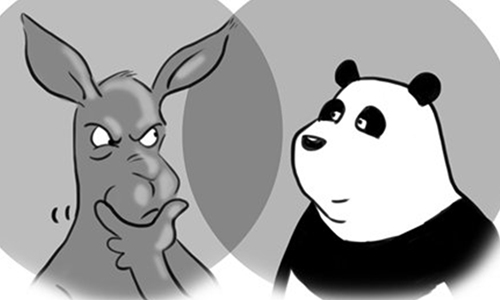Can D10 proposal help Australia break through diplomatic dilemma?
By Wang Zaibang Source: Global Times Published: 2020/8/11 10:38:40

Illustration: Liu Rui/GT
"We should stop taking our lead from the US and China," this is a suggestion Amanda Vanstone, former Australian minister for immigration, multicultural and indigenous affairs, offered for her country's foreign policy. How to do it? Vanstone came up with an idea - start a D10, of 10 middle power democracies working together. This is a vivid mirror of the Land Down Under's diplomatic predicament.
Australia is feeling pressure from both the US and China. The US has been coercing it from security and political angles to force it to be tough on China. Yet Canberra's economic ties with Beijing are so close that once it shuts out the Chinese market, major problems will quickly emerge for Australia's economic and social development. Such problems can hardly be resolved by the US.
Proposing a D10 is thus a way to skirt around the country's dilemma, to unite other middle powers while attempting to keep its independence from both the US and China. Especially at a time when tensions between Beijing and Washington keep heating up, and the US has almost opened fire at China from all directions, Australia is not willing to blindly dance to US tune, yet it seems to have few other options.
Although Vanstone did not name the countries involved in a possible D10, she may highly likely be hinting at New Zealand, South Korea, Japan, Singapore, Canada, and certain other Southeast Asian countries, as she said, "getting the cluster of democracies in Asia working together with democracies outside the region would be a useful message."
Against the backdrop of sharpening contradictions among major powers, uniting middle powers to make their voices heard and play their role in the global political ecology does have positive significance.
But it makes little sense to emphasize "democracy," or in other words, ideology. The hype over the differences between China, Russia, and Western countries over democracy and human rights has long existed since the end of World War II, why raise decades-old divergences again to assemble a group now? Australia has no other standards to raise.
Geopolitically or economically, countries across the globe have different ties with either China or the US. Yet when it comes to democracy, Western countries share a unified criterion. Unfortunately, Australia will find it hard to form a concerted group today based solely on democracy. Take the Arc of Democracy, a concept first proposed by Japanese Prime Minister Shinzo Abe about uniting the US, Australia, Japan and India to besiege China. It made no real progress, even if Japan had once made quite a splash about it. How far Australia can promote this D10 is also hard to estimate.
Ideology is indeed a crucial factor in international politics, especially for Western countries. But fundamentally, the most basic relationship among different countries is still economic, as promoting economic cooperation, trade and investment are the most elementary ways to seek development in this era. The framework for today's world is simple - one world, two systems, multiple models, peaceful competition. This is a solid principle, all else are unrealistic.
Vanstone tried to strike a balance between China and the US. But her article shows she does not understand China by claiming "Beijing does a lot of finger-pointing and sabre-rattling to please a domestic audience." Such wording sounds quite similar to that of many other Western politicians, including US Secretary of State Mike Pompeo, who still believes Chinese people are dissatisfied with and even oppose the Chinese government, hoping more divergence in thought within Chinese society will emerge in the coming future. Such logic is ridiculous.
There are a few people in Australia's political circle who do understand China, including former prime minister Kevin Rudd. Yet a majority of people are misguided by the US, which is piling growing pressure in the international political arena and through Western media outlets' biased reports. Real information about China has been extensively blocked by quite a few developed countries, including the US and Australia. As a result, a large swath of Westerners knows little about China.
The development of China-Australia ties in the future will not be smooth. On the one hand, Washington will continue creating trouble. On the other, Australia will not comprehend China properly in the near future. For instance, it tends to believe China's growing military strength is a threat to Australia. But why on earth would China threaten Australia? It will take time for Canberra to better understand Beijing.
Australia's current stance regarding its China policies is closely related to the Trump administration. Vanstone's proposal for a D10 reflects the country's anxiety. It is a third path Australia wants to find for itself, a chance to break through its diplomatic dilemma.
The author is a senior fellow of Taihe Institute and former vice president of the China Institutes of Contemporary International Relations. opinion@globaltimes.com.cn
Posted in: VIEWPOINT,OTHER REGIONS